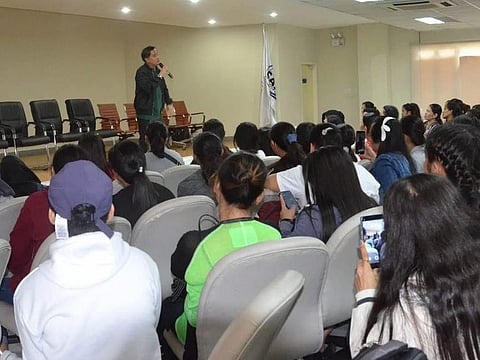Philippine government to go after illegal recruiters
Philippines has spent Dh9.6 million to repatriate distressed Filipinos this year

Dubai: The Philippine government will take action against illegal recruiters for luring over 150 Filipinos to the UAE with bogus job offers, a senior official said.
Manila’s Department of Foreign Affairs (DFA) and all the 11 Inter-Agency Council Against Trafficking (IACAT) and four non-government agencies on Sunday met the 158 Filipinos repatriated from the UAE, many of whom are considered as victims of human trafficking. The meeting was held for the first time so that necessary cases could be filed against traffickers.
“In line with President Rodrigo Duterte’s commitment to protect the welfare and well-being of Filipinos overseas, we welcome home this morning 158 OFWs, most of whom were victims of trafficking in persons,” said Foreign Affairs Undersecretary for Migrant Workers’ Affairs Sarah Lou Y. Arriola.
Ambassador Hjayceelyn M. Quintana said this latest repatriation is an initiative of the embassy and a joint effort between her office in Abu Dhabi and the Consulate-General in Dubai.
Some 74 of the repatriates were from Abu Dhabi while 84 came from Dubai.
Despite efforts to repatriate Filipinos seeking help from both missions every month, the problem seems to be “never ending”, Vice Consul Von Ryan Pangwi, third Secretary and Head of the Assistance-To-Nationals Section at the Philippine Embassy, told Gulf News.
Since January 2019, the Philippine government has repatriated more than 4,800 Filipinos from the UAE which cost the national coffers over 135.34 million pesos (Dh9.6 million).
In 2018, a total of 5,842 OFWs were repatriated from Dubai and 3,533 from Abu Dhabi, amounting to more than 175.21 million pesos worth of assistance.
The DFA shouldered the maintenance and operating costs of government shelters in Abu Dhabi and Dubai, cost of processing of exit visas, and their airfare to Manila and respective home provinces.
Vice Consul Pangwi said the Philippine government considers a case as human trafficking if there is an element of deception on the part of the recruiters.
“Although these repatriates are willing to come to the UAE to work, they were deceived and made to believe that they would work as tutors or teachers but they ended up being forced to work as household service workers (housemaids),” Pangwi said.
“We reiterate and we always encourage those who wish to work overseas to go through the proper process through the Philippine Overseas Employment Administration.”
Last month, Foreign Affairs Secretary Teodoro Locsin, Jr. and UAE Foreign Minister Sheikh Abdullah Bin Zayed Al Nahyan signed a Memorandum of Understanding on Cooperation in Combating Human Trafficking. The signing was held at the PH-UAE bilateral meeting on the sidelines of the 74th United Nations General Assembly in New York, US.
Pangwi said the MOU is a starting point and a welcome step for both countries to have a meeting of minds to combat human trafficking.
He said human trafficking requires a multi-faceted approach and among the critical lines of defence is educating and empowering jobseekers.
Five Red Flags: Don’t Accept the Job if You See these Signs
1. Recruitment is done on Social Media.
■ Many illegal recruiters use social media as their hunting ground now. Beware of job posts that are too good to be true because they are too good to be true, Pangwi said.
2. Passport is the only requirement.
■ If the recruiter is not asking for any other supporting document from you, run away.
3. “Fly out in one week.”
■ Processing jobs overseas could take time. This incredible promise that one could fly out in week could lead to bogus jobs.
4. Everything is free.
■ This is the biggest lie. Often, when you reach your country of destination, illegal recruiters will get a cut from your salary as payment, or even get the whole amount.
5. You don’t know where you’re headed.
■ Some may be told where they’re going but many are left in the dark. If this is your case, avoid these people at all costs!
Source: Vice Consul Von Ryan Pangwi, Third Secretary and Head of the Assistance-To-Nationals Section at the Philippine Embassy
